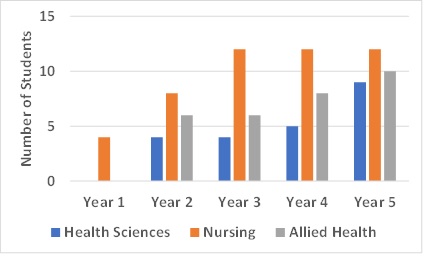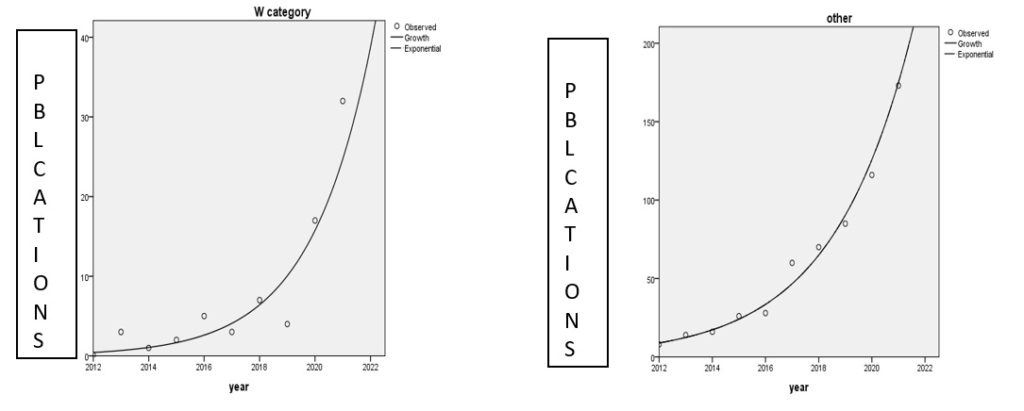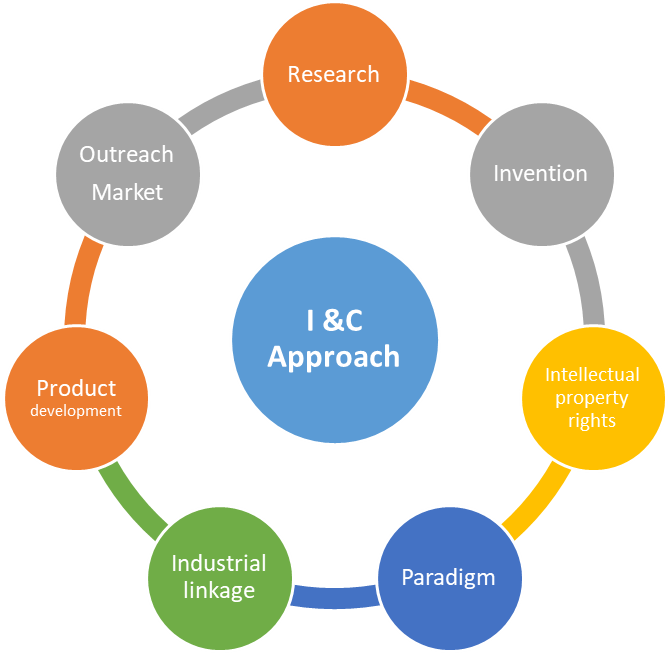Oric Strategic (5-Year) Plan (2022-2027)
Introduction
Universities play a pivotal role in preparing graduates with the knowledge and skills required to fulfill the needs of society. Higher education, besides knowledge transfer, enriches the innovation ecosystem of the academic institutions, in particular training at doctoral and post-doctoral levels. The concept of innovation ecosystem is defined as the integration of knowledge in business ecosystems. Cai, et al (2020) have elaborated on the concept of the innovation ecosystem as 1) inter-sectoral, 2) transnational and 3) indirect. The first two terms are self-explanatory whilst the third “indirect ecosystem” involves a cross-disciplinary approach towards integrating knowledge, for instance Basic and/or Clinical Sciences with Artificial Intelligence.
An exemplary university keeps a balance between teaching and research. Research groups of faculty members proactively involved in quality research of societal impact, train students because they serve as the workforce in delivering research projects. Completion of the funded research projects within the allocated budget and timeframe, and with a level of deliverables in terms of research output helps to secure successive external grants. Therefore, the university leadership must ensure academic faculty members to invest a considerable amount of their time in scientific research and dissemination of research outcomes. Annual appraisals of academic staff may be used to assess their activities and address the barriers in conducting research.
Establishing a vibrant research culture within Shifa Tameer-e-Millat University (STMU) and shaping it to enable cutting-edge research, innovation and commercialization for the growth of researchers as well as institution is the primary objective for this five-year research plan. The proposed plan will help STMU evolve into a research-intensive university.
Objectives
- To develop and implement research directions and policies
- To promote, expand and enhance the research activities of STMU
- To guide and encourage the university faculty members to acquire the local and external funding
- To facilitate the curriculum committees in integrating the research and course materials
- To translate the research outcomes into social and industrial development
- To make linkage between university and industries
- To facilitate and encourage the students and faculty members for entrepreneurship, technology- transfer and commercialization
- To facilitate and encourage the faculties to develop the multi-disciplinary and multi-institutions research projects
Key features of the 5-year research plan
Integration of Research & Education
Integration of research and education is at the heart of this research plan

Integrated research & education model
STMU Faculty
To foster an interest in research among academic faculty members and establishment of vibrant research groups of PhD Supervisors, Postdoctoral staff, Postgraduate and Undergraduate students will be useful in the staff development. STMU academic faculty members thriving for a PhD degree will have the opportunity to enroll on subsidized fee policy as per the institutional policy. This will allow horizontal growth and capacity building of staff. STMU has HEC approved three (3) PhD (Nursing, Pharmaceutical Chemistry and Pharmacology) and eight (8) MS/MPhil (Applied Biosciences, Pharmacology, Pharmaceutical Chemistry, Clinical Pharmacy Practice, Clinical Psychology, Nursing, Physical Therapy and Health Professionals Education) programs. Commencement of more PhD programs in Basic Medical Sciences with subspecialty in Physiology, Biochemistry and Anatomy, and PhD in Dentistry by fall 2022 will be the steppingstone to the establishment of research groups within various Faculties of STMU. In addition to these, a PhD program in Clinical Psychology and Public Health and MS/MPhil in Podiatry, Biostatistics & Epidemiology and Dental Surgery will be up and running in the next 2 years. Theoretical and practical excellent research training of PhD students will cultivate talent into the innovation ecosystem that will promote Entrepreneurship and Enterprise. We are expecting to have a significant increase in number of publications from the PhD researches as per the requirement of HEC.
Projection of student intake
Admission to research based postgraduate programs will provide an opportunity to the motivated students to experience the dynamic learning environment of STMU. Figure 2 projects a total number of PhD students to be around 100 in 5-year time. In Addition to PhD, MPhil and Masters Students in STMU’s approved programs will also enrich the research ecosystem.

Projection of PhD student intake
Research Portfolios
STMU Faculty and students are actively engaged in designing, executing and delivering research projects and have published 616 articles in the last 10 years. However, 185 were published in year 2021. Commencement of the PhD programs will strengthen the research portfolio of the University. The following graph shows that the growth of publications of STMU for w-category and ‘other’ categories. It is exponential with significant jump in the recent years.

Growth of publications of STMU
Proactive research groups within various faculties of STMU will have established research portfolios in 5-year times. Research students’ society will be formed to motivate and encourage students’ research which will ultimately enrich Research Ecosystem of STMU.
Based on the expertise of faculty members, the STMU will focus on diverse themes of unmet needs in health and industry, in collaboration with national and international academic and research organizations which will address discovery, creation, innovation and community outreach and reflect insight into the common areas.
In addition to these, staff will be encouraged to engage in priority research areas of National interest as mentioned by Higher Education Commission (HEC): (1) Public Health Surveillance and Epidemiology, (2) Immunology, Diagnostics & Vaccine Technology, (3) Non-Communicable Diseases, Population Health and Genomics, (4) Food security, nutrition and human capital, (5) Climate change, environmental stress and health, (5) Bio‐informatics & Big‐data Analytics, and (6) Drug Abuse
This will have more prospects in securing HEC grants.
Achieving Research Excellence
Research Funding
To further promote academic research, low budgeted small research projects are being provided to STMU Faculty to enable them to apply for external, both national & international funding. STMU has a research grant committee which will award internal grants after a careful and stringent review process to ensure quality research. . Regular progress reports are sought from the grant awardees to monitor the progress of funded studies. Funds are being released in tranches subject to the successful delivery of milestones mentioned by the Principal Investigators in the original grant application.
We will encourage and facilitate of about fifteen percent of the STMU faculty members to apply for extramural funding over next 5 years.
Research Events
1. To promote dissemination of research output and research culture, ORIC will organize events as shown in the Table below:
| Events | Number per year | Proposed number per year | Total by 2026 |
| Annual Research Day | 1 | 2 | 10 |
| International Conferences | 1 | 5 |
2. We propose to print abstracts of published articles of STMU. It would a) motivate faculty and staff for research b) disseminate research output to a wider audience. To encourage the faculties for competition, faculty with top publications will be awarded. Record of the completed research projects at STMU will be published in an abstract book annually.
3. STMU publishes a journal entitled, “Journal of Shifa Tameer-e-Millat University” biannually. The first volume (issue No 1) was published in 2018. We aim to register it with Scopus and Web of Sciences in the next 2 years. In addition, we propose to start at least two more journals, one for students and another for dentistry.
Collaborative Multidisciplinary Research
Cross-disciplinary collaborative research helps capacity building of the institution, flourishes researchers and enables them to acquire external grants. Established research portfolios in STMU will attract international collaborators. ORIC will engage STMU faculty members with international collaborative partners for research or clinical trials.
Global Institute of Human Development (GIHD) is engaged with highly esteemed International institutions and proactively publishing in journals of high impact factor. GIHD is starting a regional research capacity building program with participants from Nepal, Sri Lanka and Bangladesh
We propose to nurture this multidisciplinary research approach over the next 5-year term.
Provision of Research Services
The ORIC is setting up research services for facilitating STMU and non-STMU faculty members. The services may include nucleic acids isolation, biochemical assays, gene expression analyses etc. Repertoire of services will be increased over time. This facility will not only help staff in their research activities but will also generate some research funds to cover the cost of kits and consumables.
Capacity Building
Research Seminars / Webinars
Multidisciplinary Research Seminars / Webinars help build research culture by bringing scientific community together to discuss work-in-progress, for exchange of ideas, networking and development of communication and presentation skills. The ORIC will organize regular seminars / webinars for renewing motivation of the faculty and students. Both internal and external speakers will be engaged for research events.
Research Clinic
We propose to set up a research clinic to offer advice on all aspects of research, including research methodology, data analysis and results explanations, for STMU faculty members and students.
Innovation and Commercialization

Research & IP Legislation
ORIC will implement Ethics Policy / Technology Transfer Policy / Research Conflict of Interest Policy and SOPs to provide guidelines for the researchers and faculty members on Intellectual Property Rights (IPR) and streamline its commercialization related matters.
ORIC staff will be properly trained about IPR. Basic IPR guidelines, filing information & contact information will be provided on ORIC Website (with a request for information form). IPR Seminars will also be conducted for faculty and final year students in all faculties. More over ORIC will impart efforts regarding market analyses of university intellectual property.
Patents / Trademarks / Designs
ORIC will provide technical guidance in patent drafting, filing and granting process, along with coordination with funding bodies supporting patent. ORIC will also offer assistance in IP disclosures being prepared to patent departments or patent attorneys so as to regulate whether patent protection should be sought for the invention or not. Moreover assistance will be provided to students, researchers & faculty in filing patents and registering trademarks/ trade names, Copyrights, Patents, Industrial Designs, Trade secrets, Lay-out Designs of Integrated Circuits/Machines/Plants.
Commercialization & IP Licensing
ORIC will facilitate the researcher to acquire an IP License. This enables the researcher to protect its invention by finding an appropriate business / industrial partner who will promote the product to the market in exchange for royalties. ORICs will play a vital role for negotiations and helping the researchers throughout the signing process including, IP protection, license duration, university’s share as per IP policies, indemnifications and termination, etc. ORIC will also provide support to the researcher in prototyping and translation of research idea/ products to commercial scale by connecting them with the relevant industry and commercial sector.
I&C Linkages, Coordination and Networking:
The ORIC will develop a robust university-industry liaison by inviting potential industrial tycoons and community members to university in order to explore industrial snags and their remedies through research. Interactive sessions will increase the confidence of industry. Such kind of visits would be arranged time to time to boost their level of confidence.
ORIC will provide a stable plate form to the researchers to collaborate with the industry at National and International level. Furthermore partners will be facilitated to sign agreements leading to an aligned approach from research till product development and monetization of royalty streams. Opportunities will be explored for public-private joint projects. Research themes will be integrated with national developmental goals to support the local economy. Introductory seminars with all faculty and registered students would be arranged. All relevant information will be disseminated through emails and newsletters. Active engagement with youth entrepreneurship clubs of various university faculties will be stimulated. A culture of university exhibitions based on research & commercialization activities leading to start-ups or commercialization will also be encouraged. Shifa Entrepreneurial Society (SES) will create awareness and motivate students. Best research products/ start- ups/ idea will also be awarded/rewarded.
Business Incubation Center and ORIC
BIC works in close collaboration with ORIC. Business Incubation Center Shifa Tameer e Millat university is a center that will help new and startup companies to develop into financially viable, growing and independent entities by providing services such as physical infrastructure, seed investment, provision of business assistance, management, guidance, training and counseling. Its main goal is to produce successful firms that will leave the program financially viable and freestanding. Graduates of the business incubator program create jobs, revitalize neighborhoods, commercialize new technologies, and strengthen local and national economies. Instead of creating job seekers, BICs focuses on turning new graduates into job providers and business establishers.
Revision
This 5-year Research plan will be revisited, re-evaluated annually and revised if deemed necessary.
